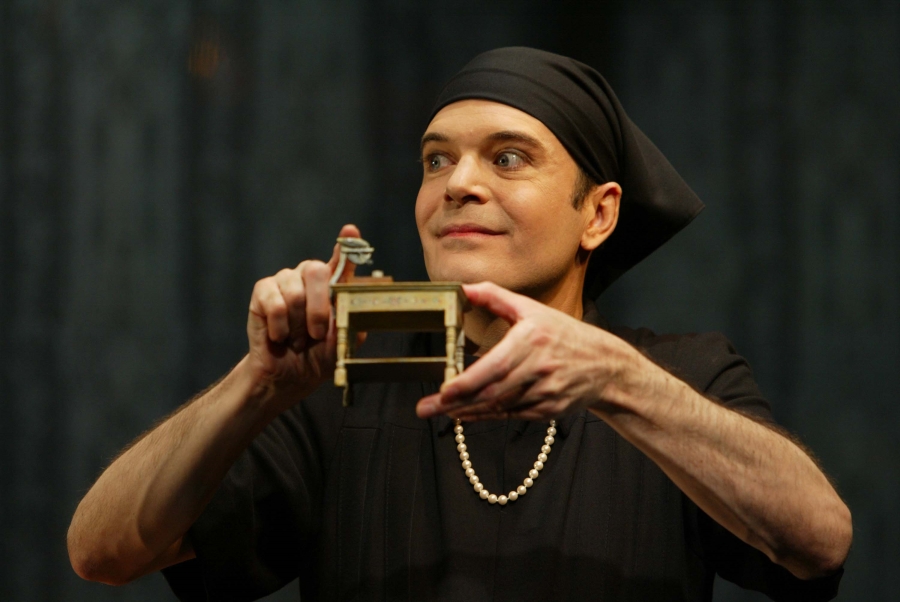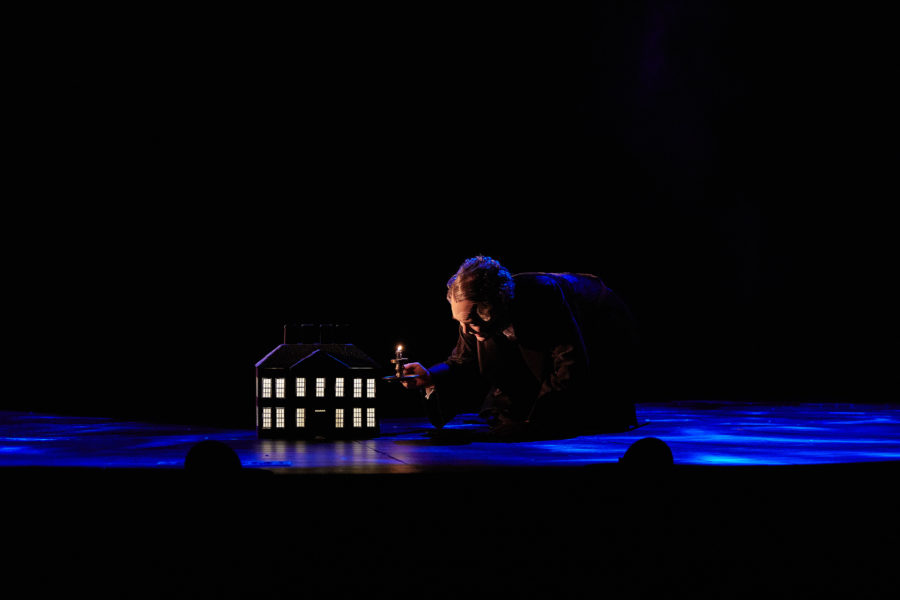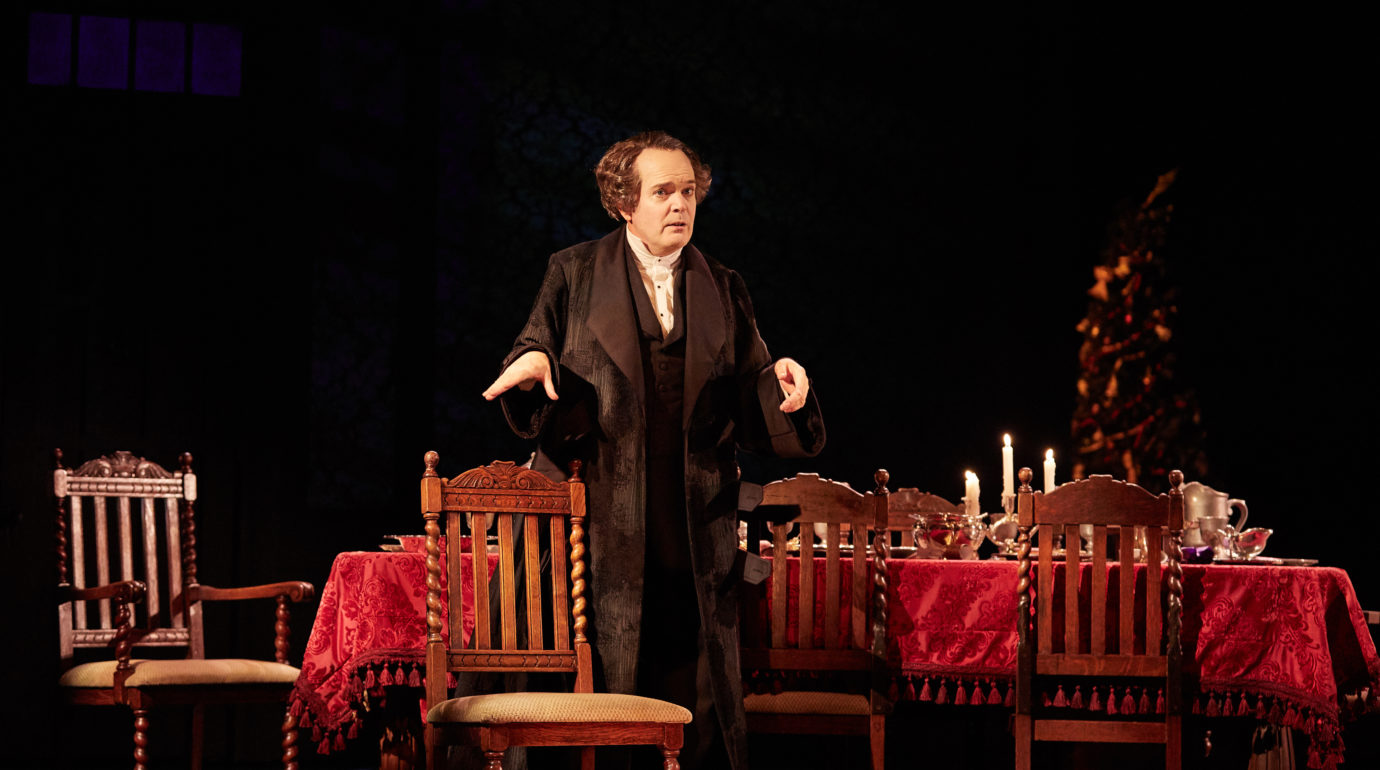Jefferson Mays has made his career out of being a chameleon: He won a Tony Award for playing 40 characters in I Am My Own Wife, and was nominated for another Tony for playing 9 characters, all of whom die onstage, in A Gentleman’s Guide to Love and Murder. So it’s perhaps no surprise that following his appearance in Oslo on Broadway in 2017 (in just a single role) that he would go back to multitasking; this month he is doing a one-man Christmas Carol at the Geffen Playhouse in Los Angeles (through Dec. 9).
This show breaks a character record for Mays: more than 50. Mays adapted the script with his wife Susan Lyons and director Michael Arden. Below, he talks about how his Christmas Carol promises to be darker than your typical holiday fare, and what makes Dickens’s tale an apt parable for these times.
DIEP TRAN: Why did you want to do A Christmas Carol?
JEFFERSON MAYS: I remember so distinctly my first encounter with A Christmas Carol. It was on a winter’s evening, appropriately enough, sometime during the Vietnam War, because I remember seeing flickering black and white images of wounded soldiers being airlifted from a battlefield. And then the family basset hound ran out of the kitchen in pursuit of one of the cats, got hopelessly caught up in the cord of the portable television, dragged it off the table, and it smashed, irreparably. My parents never replaced it.
But that night, my father took down a yellowing volume of Dickens’s Christmas books and opened to page one of A Christmas Carol, and he and my mother read the entire thing aloud to us. It was about three hours, but we were transfixed. And in many ways I think that was my first introduction to theatre. It was this great story, told to a captive audience by two wonderful performers. My father’s reading voice was sort of a detached narrator’s voice, and my mother would fully embody all of the characters to the point where it was rather alarming—this woman who was so familiar to you becoming Jacob Marley and Bob Cratchit and Ebenezer Scrooge. And I was just hooked from then on, and it became a family tradition. We would read it aloud pretty much every Christmas.
So I always loved the story and always long to share the narrative of it with other people theatrically. So often it’s adapted, and quite well, for the holidays, and it’s the cash cow of many a regional theatre as you know. And it’s a cast of thousands.
Yes, with local kids.
Right, exactly. You have all these sons and daughters of board members looking like exceedingly well-fed Cratchits. Whereas if I were directing it, I would put all the children on a starvation diet for months so they were suitably Victorian and emaciated.
But anyway, quite often, in these adaptations, as wonderful as they may be, you lose Dickens’s own narrative voice, with its wit, with its poetry, and with its social outrage. So I’m looking to get back to the story itself. We’re using Dickens’s own quite brutal edit of the unexpurgated original. I think he did it originally in Birmingham for some coal miners shortly after writing it, in this three-hour, 10-minute version, and then brutally pared it back until it was about an hour and a half. And that was the version that he trotted around. It was one of the last things he did in the United States, 1868 I think, a couple of years before his death. So ours is based on that version, with some restorations here and there and some excisions.
Will you be doing a myriad of costume changes or will it be very spare?
No, not at all. I wanted to get away from that. It’s odd, because people say, “Well, how many characters are you playing?” And I’m not sure, I haven’t counted them up. In trying to focus on the narrative, they’re not really characters. The narrative is this flow of a river, and then therein are these bodies that keep emerging out of the river and then disappearing down into it. So it’s not full embodiment of characters, it’s just sort of evocation of character, a slight change of voice, or gesture—I want it to be as economical as possible and keep the narrative flowing. So no costume changes.
Since your parents originally read it to you, for your role as a narrator of this, do you think you’ll be doing an impression of them or an impression of Dickens?
There’s some line readings of my mother’s and my father’s that, you know, are just in my head and always will be. So I’d like to think that I am embodying both my parents in doing this. I have a recording of us all reading it from the early 1980s, but I haven’t had the guts to listen to it. I lost my parents recently, and hearing their voices reading it would be a tough go right now.
Do you think you’ll do this show annually?
I’d like to, yes. This is its first outing, and we’ll see what it shapes up to be. I want to live with this for the rest of my life as I’ve lived with it from my life up until now. I think it is probably the greatest secular humanist text ever written. It’s particularly useful now to be reminded about things like charity and mercy and forbearance and benevolence and kindness and decency, and to ask the questions, “What makes a good life? What is important in life?” The basic human touchstones. I think it’s useful to be reminded of them.

You made your career on your ability to be a chameleon, to play multiple characters at one time, and so do you think you’ve kind of been leading up to this point?
Perhaps so. But this feels like another thing entirely. Again, I am sort of a narrator character, and in I Am My Own Wife, I remember having this existential crisis, like, “Who am I? Where am I in this? Who am I playing, really?” And I felt completely fragmented, and sort of torn apart by all these different characters, and I didn’t think there was any central…Here, there’s more of a central character who’s telling this story, which is me.
And then, I did a number of characters in Gentleman’s Guide to Love and Murder, and that was another thing entirely. That was all based on costume changes and broad characterizations, and a performance that was almost more athletic than artistic, in some ways. So this feels like a departure.
Every year American Theatre does a count of which plays are being produced around the country, and we even don’t include A Christmas Carol because it’ll always at the top.
Of course, there’s no competition.
David Sedaris’s Santaland Diaries is a close second. What other Christmas stories do you think more theatres should produce?
It’d be nice to have maybe a more diverse group of different kinds holiday stories. It’s astonishing that theatres across the nation come back to A Christmas Carol every year to make their money, so they can do María Irene Fornés or something. It doesn’t surprise me. But I’ve always felt a little, sort of disappointed by them.
Why?
I don’t know. I think it’s because they’re so jolly. They’re so celebratory, and it is Christmas and everything, but Dickens started out writing this extremely angry pamphlet about working conditions for children and factories. And then he got nowhere with it and he said, “You know what I’m gonna do, I’m gonna write this story, I’m gonna write this A Christmas Carol. This’ll do for that.” And we’re all very lucky that he did do that instead of writing some sort of passionate screed, which would have been, probably, read and tossed away. But it came from this place of social outrage.
There’s one line—Scrooge goes on this journey with the Ghost of Christmas Present, and he says, “In almshouse, hospital, and jail, in misery’s every refuge, where vain man in his little brief authority had not made fast the door, and barred the Spirit out, he left his blessing.” But you know who I’m thinking about, when I say “vain man in his oh-please-God brief authority.”
Speaking of vain men and evil rich people, it seems like we’re going back to a time of huge income disparities. What do you think the rich owe the poor right now?
Well, so much. We will go back, on this trajectory, to a mode of life that more resembles Victorian England. The rich owe so much to the poor in this society; they must share their wealth, and must attend to people’s needs in order for general happiness and security to be achieved. I think that’s obvious. You cannot have such disparity and have a functioning system that’s not terrified of itself and each other, and will not someday just collapse into violence.

Well, that just got dark very quickly.
I find myself kind of depressed working on it, actually. But I think there is redemption. It’s all about transformation, the possibility of transformation and redemption. And I also inevitably ask this question of why am I—a middle-aged, white, privileged man—doing this? I represent the society: Ebenezer Scrooge and his greed, and his inward turning-ness, and his callousness and hard, cold, stinginess. So I think it is appropriate that I am embracing that.
In examining your own privilege, have you found yourself becoming more charitable?
Has it had a good effect on me? Yes, it has. It’s impossible not to think about it every day…Brett Kavanaugh was in the hall right next door to me as a freshman on campus at Yale. I walked by him every day. I didn’t know him at all but you can’t help but think about him [Ed note: this interview was conducted the week of the Brett Kavanaugh Supreme Court hearing].
Was he a big drinker?
I do not know. I was not a big drinker. I had the most boring undergraduate life—I mean, I did plays. I remember walking by his fraternity. He was a DKE, Delta Kappa Epsilon, and they all were screaming, “You fucking faggot” at me in a drunken state. So that gave me a slight window into what was going on. On the grounds of belonging to that fraternity, I think you really shouldn’t be on the Supreme Court, but that’s another conversation.
Well, those are all my questions.
Okay. I’m sorry, I hope I didn’t depress you.
No, depression’s just a constant at the moment.
I’m just gonna ask you one question: How do you deal with it? What is your technique? How do you deal with it on a day-to-day basis when it seems that you wake up every morning and it’s another slew of jaw-droppingly horrifying news?
I have days where I don’t consume social media. I’m on Twitter all the time usually, so it helps me to not do that sometimes.
Well, that is very wise.
Do you do self-care?
Yes. I’m married to a magnificent person, and we read a lot to each other, actually. This is too much information, but in the tub in the morning, we each have a bath, and one sits on the toilet seat and reads a chapter to the other, and then we switch places. It’s an oasis that I look forward to every day, and it’s the highlight of my day. I love rehearsing, but it’s just so wonderful to escape into the world of literature and have a conversation with each other through a medium.
What are you reading now?
I’m embarrassed to say, we’re reading very early Dickens, Pickwick Papers, which is fantastic. We’d both thought we’d hate it, and it would just be sort of forced, sloppy humor. But they’re wonderful, beautiful character studies and anecdotes. It’s been a perfect escape.


